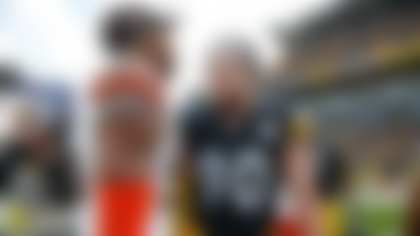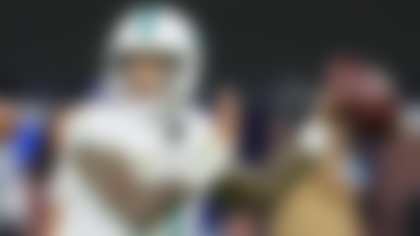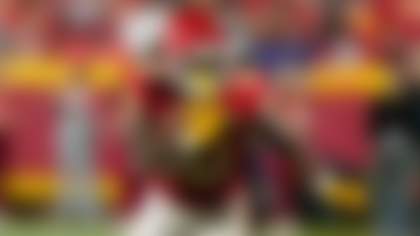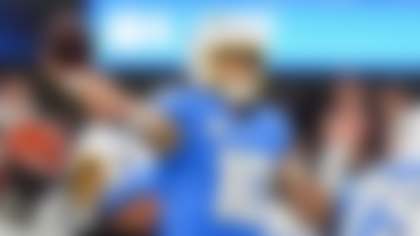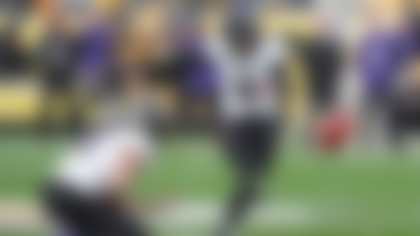Franchise quarterback is the most elusive and essential need in all of pro football. 国产外流网teams are desperate to find one, willing to part with valuable draft capital or invest millions in the hopes of adding this critical piece to the roster. But too often in their pursuit of a top-tier passer, organizations mistake adequate for exceptional, fooling themselves into thinking a middle-of-the-road passer is worthy of being the face of the franchise.
So what is a franchise quarterback, and which teams have had the best run of them? To answer these two questions, we established four simple criteria and applied them to every quarterback of the common era. To qualify, a player must have 48 starts with one team and meet two of the following three requirements:
1) Winning regular-season record.
2) Minimum passer rating of 75.0.
3) At least one selection.
None of these provisions alone paint a perfect picture, but together they help to illustrate sustained production at an above-average level. And at the core of what all fans crave from their quarterback is someone who consistently keeps the team competitive and provides a realistic shot at the playoffs. Everything else is gravy.
For every franchise passer teams get right, there are countless others they miss on entirely. That's why we've also identified each organization's biggest QB misstep. Perspective is important, and we should always remember just how bad things can get when dependable quarterback play disappears.
Because we only considered a player's performance from 1967 onward, some notable passers, such as Bart Starr and Don Meredith aren't included, while others, like Johnny Unitas, only have post-'66 production factored into their franchise QB eligibility.
I'm sure you'll agree with all of the choices below, so I don't expect any disparaging tweets. Next up: NFC South.
NOTE: totals below include AFL All-Star Game selections, while ring totals only include titles won as the team's starting quarterback. The names of franchise QBs who are also their team's current starter are bolded.
Atlanta Falcons
Who qualifies for the Falcons?
-- Matt Ryan (2008-present): 174 starts | 102-72 | 4 Pro Bowls | 94.9 passer rating | 2016 MVP
-- Michael Vick (2001-06): 67 starts | 38-28-1 | 3 Pro Bowls | 75.7 passer rating
-- Chris Chandler (1997-2001): 67 starts | 34-33 | 2 Pro Bowls | 87.4 passer rating
-- Steve Bartkowski (1975-1985): 121 starts | 55-66 record | 2 Pro Bowls | 76.0 passer rating
-- Bob Berry (1968-1972): 50 starts | 19-28-3 record | 1 | 79.2 passer rating
THE Franchise QB: Matt Ryan
No offense to Steve Bartkowski, who had more seasons with 30-plus touchdowns (2) than I ever would've thought, but there's only one correct answer here. The organization rebounded surprisingly quickly from Michael Vick's suspension and imprisonment for his involvement in a dog-fighting operation, enduring only one losing season -- with Joey Harrington, Chris Redman and Byron Leftwich under center -- before selecting Matt Ryan with the third overall pick in 2008.
Ryan has been everything the Falcons could've hoped for in a franchise QB. The 2016 MVP has the fifth-most touchdown passes (295) and third-most passing yards (46,720) since entering the NFL, and has led the Falcons to as many playoff appearances (six) in his 11 seasons as the team had produced in the previous 27. In May 2018, the team gave the veteran signal-caller to stick around, so Falcons fans are in good hands for the foreseeable future.
Biggest QB misstep: Trading Brett Favre
Chris Miller had a losing record in all but one of his seven seasons in Atlanta: He led the Falcons to a 9-5 record in 1991, after the Falcons used a second-round pick on Favre. The Hall of Famer's and disastrous performance on it (two INTs on four attempts), combined with Miller's (short-lived) career resurgence, led the organization to trade Favre to the Green Bay Packers. And, well, we all know what happened next. Miller did lead the Falcons to a playoff victory in '91, so there's that.
Longest QB drought: 1986-1996
Compared with some of the other teams around the league, enduring 11 years without a franchise QB isn't that bad. But I imagine it must've felt uncomfortably long to Falcons fans who saw Atlanta go to the playoffs just twice during that span -- while Favre emerged as one of the game's biggest stars. Only Hugh Millen, who started all of three games for the Dirty Birds, finished with a winning record (2-1) during those 11 seasons.
Carolina Panthers
Who qualifies for the Panthers?
-- Cam Newton (2011-present): 122 starts | 68-53-1 | 3 Pro Bowls | 86.4 passer rating | 2015 MVP
-- Jake Delhomme (2003-09): 90 starts | 53-37 | 1 | 82.6 passer rating
-- Steve Beuerlein (1996-2000): 51 starts | 23-28 | 1 | 87.7 passer rating
THE Franchise QB: Cam Newton
Of all the uber-talented quarterbacks of the past decade, Newton might have the highest ceiling. The biggest knocks against the three-time Pro Bowler have concerned his accuracy and durability. He's completed at least 60 percent of his passes in just three of his eight pro seasons, and while he's missed just six starts during that period, he's dealt with numerous lingering issues, including a shoulder injury that required surgery this offseason. When he's at his best (and healthy), Newton is one of the most dynamic playmakers the 国产外流网has ever seen, a fact captured by his 2015 MVP season in which he threw for 35 touchdowns, rushed for 10 more and led the Panthers to 50.
Biggest QB misstep: Jimmy Clausen
Panthers fans probably view Clausen's Carolina tenure with gratitude, for if he hadn't gone 1-9 as a rookie in 2010, the franchise wouldn't have gotten the No. 1 pick and the rights to Cam Newton in the 2011 . Still, Clausen -- a polarizing prospect out of Notre Dame -- was a big swing and miss for the team. The Panthers' former second-round pick threw just three touchdown passes (against nine interceptions) in three seasons with Carolina, never seeing any regular-season action in Years 2 or 3.
Longest QB drought: 2001-02
Being such a young franchise, the Panthers have yet to be plagued by long-term quarterback ineptitude. But in 2001 and '02, Carolina rolled out Chris Weinke, Matt Lytle, Rodney Peete and Randy Fasani for at least one start each. The four combined for 27 touchdown passes and 43 picks, making Jake Delhomme's arrival from New Orleans seem like a gift from the Football Gods.
New Orleans Saints
Who qualifies for the Saints?
-- Drew Brees (2006-present): 205 starts | 125-80 | 11 Pro Bowls | 100.6 passer rating | 1 SB ring
-- Bobby Hebert (1985-1992): 75 starts | 49-26 | 79.1 passer rating
THE Franchise QB: Drew Brees
Since signing with the Saints in 2006, Brees has thrown for the most yards (62,089) and touchdowns (440) in the NFL, while also completing a league-best 68.5 percent of his passes in this span. He's unquestionably a future first-ballot Hall of Famer and the greatest overall player in Saints history. Together with head coach Sean Payton, Brees brought New Orleans its first and only title, just four years after Hurricane Katrina decimated the city. His work to help support and rebuild the area contributed to him being a co-recipient of the Walter Payton Man of the Year award in 2006.
The Saints did endure three consecutive 7-9 seasons under Brees' watch (2014-2016) -- not what you might expect from a team led by an all-time great -- but the franchise's shortcomings during that stretch had more to do with a bottom-of-the-barrel defense than anything Brees could control. And I can't imagine Saints fans have already lost perspective on football life before Brees, when their team made five playoff appearances in 39 years. (New Orleans has made seven postseasons in 13 years with Brees.) It's truly hard to overstate his impact on both the franchise and the city.
Biggest QB misstep: Dave Wilson
Taken with a first-round pick in the 1981 supplemental draft, Wilson was supposed to be the successor to Archie Manning (more on him below). But the former Illinois star inherited many of the issues that plagued Manning -- including poor surrounding talent -- leading to a disastrous rookie season that included 1 TD pass and 11 picks in 11 games (four starts). After a severe knee injury suffered in the preseason of his sophomore season erased Year 2, Wilson was relegated to QB2 status in '83 and '84. Wilson's outlook only worsened in '85, after the team signed USFL stud Bobby Hebert to a five-year deal just as Wilson had positioned himself to be the team's starter. Six years deep into his pro career -- and after just 31 starts -- Wilson was consigned to the sideline, where he watched Hebert and the Saints suddenly transform into one of the league's best teams.
Longest QB drought: 1993-2005
Archie Manning presents a bit of a problem with our system. The Saints' first-round pick in '71 (No. 2 overall) made two Pro Bowls with New Orleans and was the team's undisputed starter for a decade. But he didn't qualify as a franchise QB here because of his 67.4 passer rating and abysmal 35-91-3 record. Manning, perhaps more unfairly than any other QB we'll discuss, is penalized for being on bad overall teams. He routinely ranked in the top 10 in sacks taken and had only one season in which his defense ranked among the top half of the league in points allowed. Because Manning falls into a gray area, it doesn't feel right counting his time in New Orleans toward the team's franchise QB drought. What does feel more appropriate, however, is shining a spotlight on some of the Saints' QBs of the '90s, a group that includes Heath Shuler, Kerry Collins, Danny Wuerffel and two(!) Billy Joes (Hobert and Tolliver).
Tampa Bay Buccaneers
Who qualifies for the Bucs?
-- Jameis Winston (2015-present): 54 starts | 21-33 | 1 | 87.8 passer rating
-- Brad Johnson (2001-04): 49 starts | 26-23 | 1 | 83.2 passer rating | 1 SB ring
THE Franchise QB: Brad Johnson
This is a tricky one. Although Winston, in just 56 career games, has set nearly every major passing record (he's 192 yards short of Vinny Testaverde's yards mark) in team history, he also has a worse INT percentage, completion percentage and win-loss record than Johnson. Plus, he's yet to play in the postseason. That, ultimately, is why I defer to Johnson here. There's no question that Johnson benefited from an elite defense, while Winston has had anything but. There's also no question that Winston has not lived up to his draft status. First overall picks simply should not get benched in Year 4 for Ryan Fitzpatrick.
Biggest QB misstep: Trading Steve Young
Does Young become the quarterback we know today, erasing the Bucs' decade of defeat from memory, if he stays in Tampa and never operates Bill Walsh's West Coast offense? Who knows? But if I'm a Bucs fan, the answer is a resounding yes. The Bucs moved on from Young after a 2-12 season netted them the 1987 No. 1 overall pick, which they used to draft hotshot Miami QB Vinny Testaverde. Testaverde went on to play 21 seasons in the 国产外流网-- but only six of those (all of them losing) were in Tampa. Yeah ... the Bucs should've kept Young and drafted Cornelius Bennett instead.
Longest QB drought: 1976-2000
Doug Williams arguably deserves better than to be included in this 25-year span, while Trent Dilfer and Shaun King were both serviceable (at best) during their stints. But this quarter-century of Bucs football could become merely a (troubling) footnote in franchise history, if Winston can resurrect his career and restore a winning culture. The former Heisman Trophy winner has all the tools to surpass Johnson as the franchise's all-time QB1, and perhaps he will under Bruce Arians' tutelage. But if the fifth-year pro turns in another subpar season -- by 2019 standards -- he could see his time in Tampa come to an abrupt end.
Follow Ali Bhanpuri on Twitter .

